
Spilomelinae is a very species-rich subfamily of the lepidopteran family Crambidae, the crambid snout moths. With 4,135 described species in 344 genera worldwide, it is the most speciose group among pyraloids.

Crambinae is a large subfamily of the lepidopteran family Crambidae, the crambid snout moths. It currently includes over 1,800 species worldwide. The larvae are root feeders or stem borers, mostly on grasses. A few species are pests of sod grasses, maize, sugar cane, rice, and other Poaceae. The monophyly of this group is supported by the structure of the tympanal organs and the phallus attached medially to the juxta, as well as genetic analyses.
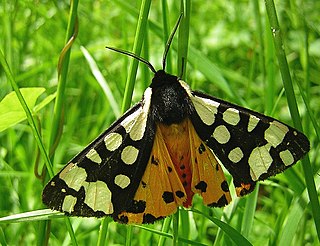
The Arctiina are a subtribe of moths in the family Erebidae.

Hadenini is a tribe of cutworm or dart moths in the family Noctuidae. There are more than 140 genera and 1,000 described species in Hadenini, found worldwide.

Amata is a genus of tiger moths in the family Erebidae. The genus was erected by Johan Christian Fabricius in 1807.

Cisthene is a genus of lichen moths in the family Erebidae. The genus was erected by Francis Walker in 1854.
Paracles is a genus of moths in the subfamily Arctiinae. The genus was described by Francis Walker in 1855. The species range from Panama to Patagonia, with quite a few in the southern temperate region of South America.

Trichromia is a genus of moths in the family Erebidae erected by Jacob Hübner in 1819. The members of this genus are largely indigenous to South America.

Anania is a genus of moths of the family Crambidae described by Jacob Hübner in 1823.
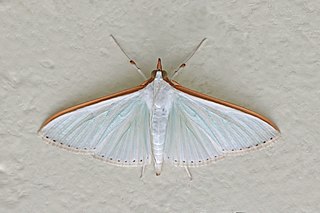
Diaphania is a genus of moths of the family Crambidae.

Scoparia is a grass moth genus of subfamily Scopariinae. Some authors have assigned the synonymous taxon Sineudonia to the snout moth family (Pyralidae), where all grass moths were once also included, but this seems to be in error.
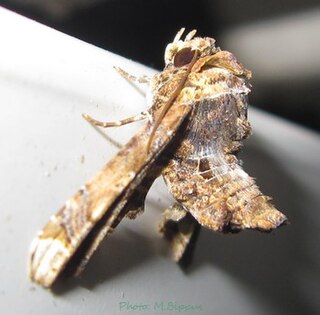
Eutelia is a genus of moths of the family Euteliidae erected by Jacob Hübner in 1823.

Leucania is a genus of moths of the family Noctuidae first described by Ferdinand Ochsenheimer in 1816.
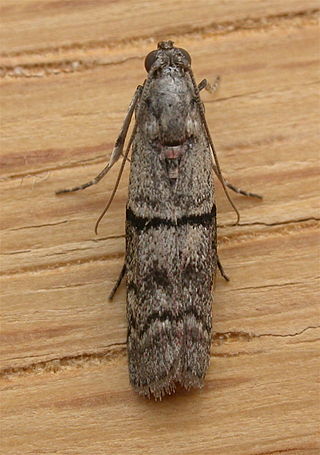
The Phycitini are a tribe of moths of the family Pyralidae.
Paracles albescens is a moth of the subfamily Arctiinae first described by George Hampson in 1901. It is found in Venezuela and Peru.
Paracles discalis is a moth of the subfamily Arctiinae first described by George Hampson in 1905. It is found in Paraguay.
Paracles fulvicollis is a moth of the subfamily Arctiinae first described by George Hampson in 1905. It is found in Chile. There are several species in the southern temperate region of South America, from Panama to Patagonia.
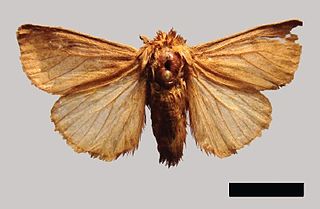
Paracles argentina is a moth of the subfamily Arctiinae first described by Carlos Berg in 1877. It is found in Corrientes Province, Argentina.

Paracles uruguayensis is a moth of the subfamily Arctiinae first described by Carlos Berg in 1886. It is found in Uruguay.














